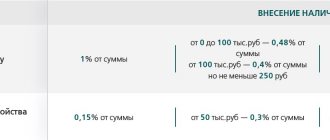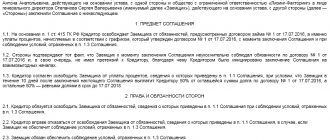Can an interest-free loan be issued to another organization?
Yes, this possibility is provided for by the Civil Code.
According to Art. 808 of the Civil Code of the Russian Federation, a loan agreement between legal entities must be concluded on paper. It is also necessary to state that there is no interest on a cash loan, since otherwise, by default, the loan fee should be calculated based on the refinancing rate on the date of repayment of the loan or part thereof (clause 1 of Article 809 of the Civil Code of the Russian Federation). If the subject of the agreement is things, then such an agreement will be considered interest-free if there is no mention of this condition in it. When completing such transactions, the accountant is faced with the question of the tax consequences of an interest-free loan between legal entities. This is discussed in the next section, where we only talk about agreements between companies independent of each other, those that do not fall under the terms of Art. 105.1 Tax Code of the Russian Federation.
ConsultantPlus experts told us how to conclude a cash loan agreement between legal entities. Get trial access to the system and upgrade to the Ready Solution for free.
Documenting
The main document that governs the receipt of a commodity loan is an agreement. When drawing up it, you need to take into account the nuances of the form of lending in question, as well as the rules for drawing up a purchase and sale agreement. Let's consider all the nuances of drawing up a contract:
- A clause is indicated on the right to transfer ownership of a thing from one legal entity to another.
- The provisions of a standard purchase and sale agreement are prescribed: type of asset, its characteristics, quantity.
- Additional items are indicated: availability of interest, loan repayment terms.
As a rule, the contract contains information about the real value of the transferred object.
FOR YOUR INFORMATION! The agreement is recognized as concluded from the date of transfer of the thing on the basis of Article 760 of the Civil Code of the Russian Federation. If an agreement is concluded between legal entities, it must be drawn up in writing (clause 1 of Article 761 of the Civil Code of the Russian Federation). The debtor must return the object within the time period specified in the agreement.
Tax risks of interest-free loans between independent organizations
If the lender has received loans or borrowings on which he pays interest, then the tax authorities may consider it unlawful to accept such interest as expenses, since the funds received from the loan were used to issue an interest-free loan. It is advisable to challenge such decisions of tax authorities in court, proving that the loan was used for other purposes, and the interest-free loan was issued from one’s own funds. Examples: the resolution of the Federal Antimonopoly Service of the North-Western District dated July 1, 2015 No. F07-3688/15 is not in favor of the taxpayer, a positive decision in the resolution of the Federal Antimonopoly Service of the Ural District dated January 14, 2009 No. F09-10027/08-C3.
Can additional income be accrued to the lender by calculating it from the market rate on loans? For independent entities, the Tax Code of the Russian Federation does not contain rules obliging the accrual of abstract income on interest-free loans between legal entities, so the loan provider should not have any problems (letter of the Ministry of Finance of the Russian Federation dated August 11, 2011 No. 03-03-06/2/120).
Do tax authorities have the right to accrue additional income from a borrower-legal entity by analogy with the material benefit from a loan without interest? In the Tax Code of the Russian Federation, for income tax purposes, there is no concept of material benefit from an interest-free loan between legal entities. The Ministry of Finance also comments on the illegality of such additional charges, for example, in letter dated March 23, 2017 No. 03-03-RZ/16846. The tax authorities do not argue with this approach (letter from the Federal Tax Service of Russia for Moscow dated November 22, 2011 No. 16-15/ [email protected] ). But an interest-free loan between a legal entity and an individual, including individual entrepreneurs, has its own tax nuances within the framework of calculating personal income tax on material benefits.
Read about this in our article “How material benefits are taxed with personal income tax (rate).”
Find out about the tax consequences of an interest-free loan in the Typical situation from ConsultantPlus. Learn for free with a free trial of the legal system.
Tax risks
As already mentioned, loans between interdependent entities entail tax risks. They will be different for the borrower and the lender.
Risks for the borrower
Transactions between related parties are subject to administration by the Federal Tax Service. The transaction is checked for compliance with market prices (based on letter of the Ministry of Finance No. 03-01-18/9-173 dated November 19, 2012). The type of loans in question must comply with the special requirements of the Tax Code of the Russian Federation. In particular, the assessment of income in case of gratuitous transfer is carried out on the basis of market prices established on the basis of 105.3 of the Tax Code of the Russian Federation.
Risks for the lender
If, as part of a loan, property is transferred to a dependent entity for gratuitous use, the payer makes the decision to pay VAT as for the sale of services independently. However, he needs to take into account that refusal to charge VAT on the market value entails significant tax risks.
IMPORTANT! Accrued VAT is not taken into account for profit tax purposes on the basis of paragraph 19 of Article 270 of the Tax Code of the Russian Federation.
In what cases do tax risks arise?
Tax risks arise in two cases:
- The loan falls under the characteristics of controlled transactions established by subparagraph 1 of paragraph 2 of Article 105.14 of the Tax Code of the Russian Federation (availability of a certain amount and interdependence of participants).
- The loan was provided on non-market terms (no interest or a symbolic amount).
Legal entities must take into account that most transactions between interdependent entities are controlled.
Interest-free loan between a legal entity and an individual
A transaction where an interest-free loan is given by an independent individual to an organization will not entail an increase in the tax burden on any of the parties to the transaction. Interest-free loans between an individual and a legal entity, including if the loan is provided by an individual entrepreneur, do not increase the taxable income of the borrower (see explanatory letters from government agencies from the previous section). For individuals, the Tax Code of the Russian Federation also does not contain any grounds for additional accrual of lost income.
In addition, the amount of the loan issued or repaid cannot be recognized as income for any party in accordance with subparagraph. 10 p. 1 art. 251 Tax Code of the Russian Federation. This is confirmed by court decisions, for example, resolution of the Federal Antimonopoly Service of the Ural District dated January 14, 2009 No. F09-10027/08-S3. The same applies to expenses: the amount of a loan issued or repaid is not an expense (Clause 12, Article 270 of the Tax Code of the Russian Federation).
Tax consequences for the lender of a legal entity
If the lender is an organization that is subject to the general taxation system, then the funds transferred to the borrower in the form of an interest-free loan, as well as the amounts received into the account as loan repayment are not included in expenses and income - this is regulated by clause 12 of Art. 270, sub. 10 p. 1 art. 251 Tax Code of the Russian Federation.
The return of funds to the lender's account as a return of the principal debt is not considered income, but there are exceptions in situations where the return of the loan is recognized as bad. This happens when:
- the debtor enterprise has been liquidated and a corresponding entry has been made in the Unified State Register of Legal Entities;
- the debtor enterprise is declared bankrupt, and the court’s ruling on the end of bankruptcy proceedings has entered into force.
In such situations, bad debt can be classified as unrealized expenses in accordance with subparagraph. 2 p. 2 art. 265 Tax Code of the Russian Federation.
Transactions that are related to the provision of a loan or its repayment are not subject to taxation and are not subject to VAT. Providing a loan only in cash is not subject to VAT.
Tax consequences of interest-free loans between related parties
If a transaction with an interest-free loan is carried out between organizations that are interdependent, then additional tax consequences arise in connection with Section V of the Tax Code of the Russian Federation.
Find criteria for interdependence here.
If the parties to a transaction are interdependent, the next step is to determine whether the transaction is controlled.
Our article “Criteria for controlled transactions - table” will help with this.
If the transaction does not fall under the criteria of a controlled one, and the parties to the transaction are Russian organizations or citizens, then they do not bear additional tax risks. If one of the interdependent parties is a foreign entity, then such a transaction automatically falls under the controlled ones (Article 105.14 of the Tax Code of the Russian Federation, letter of the Ministry of Finance of the Russian Federation dated September 4, 2015 No. 03-01-11/51070), and for this option - the next section of the article.
ATTENTION! As of 01/01/2017, a new tax rule is in effect. If a transaction involving an interest-free loan is carried out between interdependent legal entities that are registered on the territory of the Russian Federation, or with the participation of citizens of the Russian Federation, then it is not recognized as controlled (subclause 7, clause 4, article 105.14 of the Tax Code of the Russian Federation).
This means that the lender is now safe from additional income in the form of interest at the market rate. In the letter of the Ministry of Finance dated 04/21/2017 No. 03-12-11/1/24048, it is commented that the innovation is also valid for contracts concluded earlier than 01/01/2017, the main thing is that income and expenses on it are recognized after 01/01/2017.
Loan agreement between related parties
Interdependent organizations are entities that meet a number of characteristics. They are specified in paragraph 2 of Article 105.1 of the Tax Code of the Russian Federation:
- One entity participates in the capital of the second by more than 25%.
- One entity owns more than 50% of another.
- The heads of the organizations are the same persons.
- The management teams of the companies include the same individuals.
Question: Does an LLC have the right to issue an interest-free loan to an individual entrepreneur if he is one of the founders and director? Is such a loan considered a transaction with related parties? Does an individual entrepreneur have income subject to personal income tax? View answer
Establishing interdependence can be carried out on other grounds if they have a significant impact on the terms of transactions between legal entities (clause 2 of Article 105.1 of the Tax Code of the Russian Federation).
What does a taxpayer need to know about transactions between related parties ?
Loan agreements between interdependent entities are divided into these types:
- Paid. The borrower returns to the lender not only the amount of debt, but also the interest on it.
- Free. Interest is not calculated.
Loans between interdependent legal entities can be classified as controlled transactions if the signs from subparagraphs 2-3 of Article 105.14 of the Tax Code of the Russian Federation are present.
What are interest-free loans between related parties ?
Tax consequences of interest-free loans in a controlled transaction
If the issued interest-free loan relates to a controlled transaction, for example, one of the parties is not a resident of the Russian Federation, then Art. 269 of the Tax Code of the Russian Federation. When calculating income tax, the lender must take into account income in the form of unearned interest. To calculate the amount of interest, it is necessary to take into account the requirements of clauses 1.1, 1.2 of Art. 269 of the Tax Code of the Russian Federation. The actual interest rate (FP) on the loan must be compared with the established interval (see table below).
| Type of loan | Interval |
| In rubles (place of registration, residence, tax residence of the parties - Russian Federation) | MIN = 0%, MAX = 180% of the refinancing rate of the Central Bank of the Russian Federation (for 2015), MIN = 75% to MAX = 125% of the key rate of the Central Bank of the Russian Federation (starting from 01/01/2016) |
| Other loans in rubles | MIN = 75%, MAX = 180% of the refinancing rate of the Central Bank of the Russian Federation (for 2015), MIN = 75% to MAX = 125% of the key rate of the Central Bank of the Russian Federation (starting from 01/01/2016) |
| In euros (in Chinese yuan, in pounds sterling) | MIN = EURIBOR (SHIBOR, LIBOR) + 4%, MAX = EURIBOR (SHIBOR, LIBOR) + 7% |
| In Swiss francs or Japanese yen | MIN = LIBOR + 2%, MAX = LIBOR + 5% |
| In other currencies | MIN = LIBOR (in dollars) + 4%, MAX = LIBOR (in dollars) + 7% |
The lender can recognize actual income on the loan if FP>MIN. The borrower may recognize the actual loan expense if FP<MAX. For an interest-free loan, the FI is equal to 0, therefore, we calculate taxable income at the minimum interval rate (MIN), the expense on the received interest-free loan will be equal to 0.
Additional Information
On January 1, 2022, some changes to tax legislation came into force. In particular, interest-free loans between Russian interdependent entities are not subject to control. The relevant provisions are contained in subparagraph 7, paragraph 4 of Article 105.14 of the Tax Code of the Russian Federation, in letter of the Ministry of Finance No. 03-03-RZ/16846 dated March 23, 2017. The Federal Tax Service letter No. ED-4-13/6968 dated April 13, 2022 states that the loan is not subject to tax control if the place of registration of the legal entity is Russia. The date of conclusion of the contract is not taken into account.
Accounting entries for interest-free loans
Postings for an interest-free loan depend on the other party to the transaction. An employee received an interest-free loan - accounting entries are made using account 73. If this is a third-party individual, then account 76. If a transaction on an interest-free loan is made between legal entities, then account 76 is also used. In entries for an interest-free loan issued to another organization, account 58 should not be used maybe, since a loan with a rate of 0 is not a financial investment. The table below lists possible accounting options for interest-free loan transactions between legal entities, as well as with individuals.
| Description | Dt | CT |
| Accounting with the lender | ||
| An interest-free loan was issued | 73.1, 76 | 51, 50 |
| Loan amount repaid | 51, 50 | 73.1, 76 |
| Personal income tax is withheld from the employee’s material benefit | 70 | 68 subaccount “NDFL” |
| PNO accrued if the transaction is recognized as controlled | 99 | 68 subaccount “Income tax” |
| Accounting with the borrower | ||
| Received an interest-free loan | 51, 50 | 66, 67 |
| Loan amount repaid | 66, 67 | 51, 50 |
Results
An interest-free loan between legal entities or between a citizen and an organization is completely legal. If the parties to such an agreement are independent persons or any Russian persons, then they will not bear an additional tax burden. Tax risks in such a transaction arise if it is recognized as controlled. Then the lender must accrue additional taxable income based on the requirements of the Tax Code of the Russian Federation.
Sources:
- Civil Code of the Russian Federation
- Tax Code of the Russian Federation
You can find more complete information on the topic in ConsultantPlus. Free trial access to the system for 2 days.



